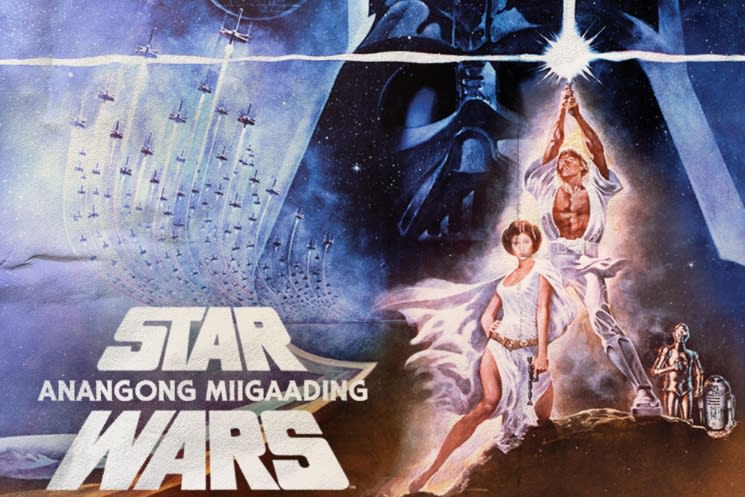Dakota Ojibway Tribal Council and the University of Manitoba have joined forces with Disney/Lucasfilm to create an official Anishinaabemowin (Ojibwe) version of Star Wars: A New Hope.
The Ojibway-dubbed edition of the iconic 1977 Star Wars film — starring Harrison Ford, Carrie Fisher and Mark Hamill — will start coming together next year, with open-call auditions for voice actors and recording expected to be held in Winnipeg. There will also be an eventual premiere in the Manitoba capital, followed by theatrical screenings across Canada and airing on the Aboriginal Peoples Television Network (APTN).
This marks only the second time the first film of the beloved George Lucas franchise has been translated into an Indigenous language, joining the 2013 Navajo version. Ojibway was selected as the most-spoken Indigenous language in Manitoba, Ontario and Minnesota, with an estimated 320,000 speakers across North America.
The project is being supported in part by the Government of Canada through the Indigenous Languages and Cultures Program from Canadian Heritage, as well as Disney/Lucasfilm and APTN.
"A New Hope, one of the most iconic movies of all time, being available in Anishinaabemowin (Ojibwe) will help showcase this language to the world," the Honourable Pascale St-Onge, Minister of Canadian Heritage, said in a statement. "It is my hope that this is just the beginning of many projects where stories are made available in First Nations, Métis and Inuit languages. Our government will always be there for communities in their efforts to cherish and revitalize their languages because they are an integral part of culture and identity and contribute to a sense of belonging."
"Language is how knowledge is kept and handed down to future generations, within language we can hear our history and hopes for the future," added the Honourable Dan Vandal, Minister of Northern Affairs. "Our government, together with our partners, are acting to remedy the damage that colonization has caused to Indigenous languages. Projects like this are crucial to revitalizing Indigenous languages and bringing them to new audiences so Indigenous Peoples can see themselves and their languages have a place at home and in a galaxy far, far away."
The Ojibway-dubbed edition of the iconic 1977 Star Wars film — starring Harrison Ford, Carrie Fisher and Mark Hamill — will start coming together next year, with open-call auditions for voice actors and recording expected to be held in Winnipeg. There will also be an eventual premiere in the Manitoba capital, followed by theatrical screenings across Canada and airing on the Aboriginal Peoples Television Network (APTN).
This marks only the second time the first film of the beloved George Lucas franchise has been translated into an Indigenous language, joining the 2013 Navajo version. Ojibway was selected as the most-spoken Indigenous language in Manitoba, Ontario and Minnesota, with an estimated 320,000 speakers across North America.
The project is being supported in part by the Government of Canada through the Indigenous Languages and Cultures Program from Canadian Heritage, as well as Disney/Lucasfilm and APTN.
"A New Hope, one of the most iconic movies of all time, being available in Anishinaabemowin (Ojibwe) will help showcase this language to the world," the Honourable Pascale St-Onge, Minister of Canadian Heritage, said in a statement. "It is my hope that this is just the beginning of many projects where stories are made available in First Nations, Métis and Inuit languages. Our government will always be there for communities in their efforts to cherish and revitalize their languages because they are an integral part of culture and identity and contribute to a sense of belonging."
"Language is how knowledge is kept and handed down to future generations, within language we can hear our history and hopes for the future," added the Honourable Dan Vandal, Minister of Northern Affairs. "Our government, together with our partners, are acting to remedy the damage that colonization has caused to Indigenous languages. Projects like this are crucial to revitalizing Indigenous languages and bringing them to new audiences so Indigenous Peoples can see themselves and their languages have a place at home and in a galaxy far, far away."
